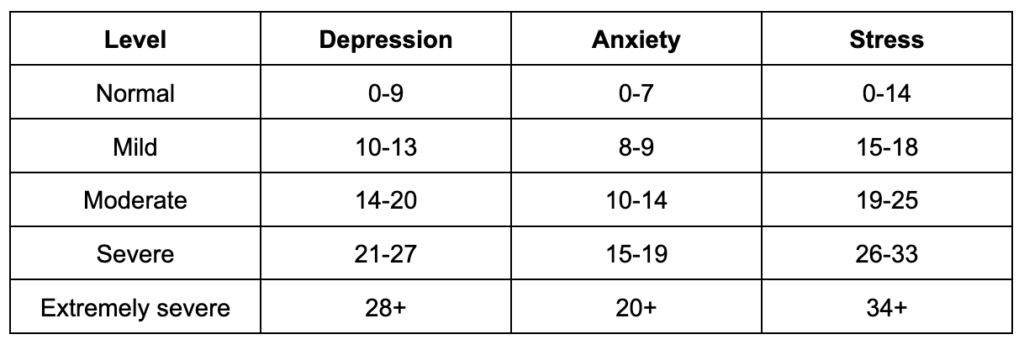The Depression Anxiety Stress Scales (DASS) is a set of three self-report scales designed to measure the emotional states of depression, anxiety, and stress. Developed by researchers at the University of New South Wales in Australia, the DASS is used both clinically and in research to assess and understand these three aspects of emotional distress. Here’s a detailed look at each component:
- Purpose: The DASS was created to differentiate between features of depression, anxiety, and stress, helping clinicians and researchers to understand the extent and nature of the distress being experienced by an individual.
- Structure: The DASS consists of 42 items divided into three scales:
- Depression Scale: Assesses dysphoria, hopelessness, devaluation of life, self-deprecation, lack of interest/involvement, anhedonia, and inertia.
- Anxiety Scale: Evaluates autonomic arousal, skeletal muscle effects, situational anxiety, and subjective experience of anxious affect.
- Stress Scale: Focuses on levels of chronic non-specific arousal, assessing difficulty relaxing, nervous arousal, and being easily upset/agitated, irritable/over-reactive, and impatient.
- DASS21: This is an abbreviated 50% version of DASS
- Scoring: Each of the three scales contains 14 items, rated on a 4-point scale (from 0 to 3), based on the frequency or severity of the states over the past week. The scores for each scale are then summed up, providing a total score for each of Depression, Anxiety, and Stress between 0-42
- The mild/moderate/severe threshold numbers vary for each axis, so they can not be easily summarised.
- Interpretation: The scores indicate the severity of the symptoms of depression, anxiety, and stress. Higher scores correspond to more severe symptom levels. The scales can be used separately or in combination to give a detailed understanding of a person’s emotional state.
- Uses: The DASS is widely used in both clinical settings for assessment and treatment planning and in research for studying emotional disorders, the efficacy of interventions, and for exploring the nature of emotional states.
- Advantages: One of the main strengths of the DASS is its ability to differentiate between depression, anxiety, and stress, which often overlap in symptomatology. This can assist in more accurate diagnosis and treatment planning.
- Validation and Reliability: The DASS has been subjected to rigorous psychometric testing. It has been found to be a reliable and valid instrument for measuring depression, anxiety, and stress in both clinical and normal populations.
- Accessibility: The DASS is available in a shorter version as well, known as the DASS-21, which contains 7 items for each scale and is quicker to administer.
The DASS provides a comprehensive and differentiated picture of an individual’s emotional state, which is crucial for effective psychological assessment and intervention. It is a valuable tool for clinicians and researchers in understanding and addressing emotional disorders.

DASS Scoring
